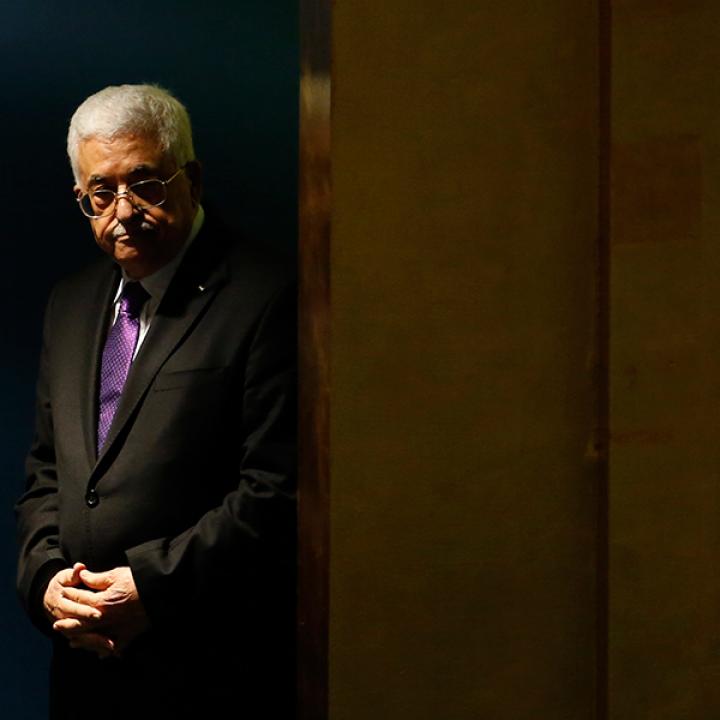
- Policy Analysis
- Articles & Op-Eds
How Israeli Annexation Talk Is Already Reshaping the Middle East

The Palestinians are withdrawing from peace deals, and Jordan could be next as Israel edges closer to appropriating land outright.
With Israel weighing whether to annex parts of the West Bank in the coming months, Palestinian President Mahmoud Abbas announced Tuesday that his self-governing administration in Ramallah would no longer be bound by existing agreements with the Jewish state, including security cooperation, in what could be the beginning of a violent spiral in the region.
Other Arab leaders have also warned Israel against annexing any West Bank territory, including Jordan’s King Abdullah II, who said last week that Israel was on course for a “massive conflict” with his country.
While annexation could be months off—and might not happen at all—the responses from the two leaders who stand to be affected most by any Israeli move underscored just how sensitive the issue is, even after more than 50 years of Israeli occupation of the territory.
“The Palestine Liberation Organization and the State of Palestine are absolved, as of today, of all the agreements and understandings with the American and Israeli governments and of all the obligations based on these understandings and agreements, including the security ones,” Abbas said at a meeting for the Palestinian leadership in Ramallah, according to the official Wafa news agency.
The possibility of annexation was included in a power-sharing deal between Prime Minister Benjamin Netanyahu and his former rival, Benny Gantz of the Blue and White party, which ended nearly 500 days of political deadlock last month. Their joint government—which Netanyahu will lead for 18 months before handing the reins to Gantz—was sworn in this past Sunday.
Although it’s not clear which parts of the West Bank Israel would incorporate, nor even if it would go ahead with annexation, the coalition deal allows Netanyahu to bypass his own cabinet and put the issue directly to parliament after July 1—so long as he has the support of the Trump administration.
That means Gantz, who is considered a relative moderate, could not veto the move. Even if Gantz’s faction opposes annexation, Netanyahu is likely to have a majority for it in parliament.
Israel has occupied the West Bank for over five decades—since fighting a quick and decisive war with its neighbors in 1967. Still, any move to make Israeli rule there official would send shockwaves through the region.
Senior Trump administration officials have indicated that it will be “Israel’s decision” on whether to press ahead with annexation, although recent reports have raised some doubt as to the exact timeline and process expected by Washington. U.S. President Donald Trump’s Middle East peace plan, released earlier this year, envisions up to 30 percent of the West Bank being incorporated into Israel, including the strategic Jordan Valley. But Netanyahu, now in his fifth term as prime minister, might settle for a smaller area that includes the larger and more populous settlement blocs Israel has built in the territory over the decades.
Right-wing Israeli politicians, including Netanyahu, have said they view the current moment as a “historic window of opportunity” to fulfill their ideological vision—just ahead of November’s U.S. election while a cheerleading president is still in the White House, and with the entire world consumed by the coronavirus.
Outside of Jerusalem and Washington, however, annexation is viewed with increasing alarm as the possible death blow to any negotiated two-state solution to the Israeli-Palestinian conflict.
Already, officials stretching the gamut from the United Nations to the European Union and Arab League, Canada to Saudi Arabia and the United Arab Emirates, have issued warnings to Israel. Europe is reportedly debating some form of sanctions, including freezing Israel out of joint scientific and educational projects—although member states are still divided on the issue.
Among the people raising concerns are some former security officials in Israel.
“We already have security control [in the Jordan Valley],” said retired Maj. Gen. Amos Yadlin, the head of the Institute for National Security Studies in Tel Aviv and a former military intelligence chief.
“Annexation won’t change anything, our legitimacy there will decrease, and only one country in the world will support it—and even that may change with a new American president,” he told Foreign Policy. “There’s only an ideological interest here, with only economic and diplomatic downsides.”
Yadlin made clear that the doomsday scenarios forecasted by some—a severing of the peace treaty with Jordan, escalation in the West Bank, referral to the International Criminal Court—were not inevitable, although annexation would increase the chances of them coming to pass.
“And even if none of these happen,” Yadlin said, “this would still be a bad move. It would end the option of ever separating from the Palestinians and, with that, the option of two states.”
Saeb Erekat, the secretary-general of the Palestine Liberation Organization, told Foreign Policy that “annexation of any part of occupied Palestine is a crime that will end the prospects of a negotiated solution just as it is an attack against international law and the whole idea of a rules-based world order.” Erekat added that diplomatic action—including sanctions on Israel—was “an international responsibility,” with the Palestinians already attempting to coordinate a united front with European and Arab partners.
Palestinian Prime Minister Mohammad Shtayyeh already warned last week that annexation would force the Palestinian Authority to reconsider every aspect of its relationship with Israel.
“Things are going to be really ugly if they are going to go do what they are planning to do,” he said in a private roundtable last week for the Middle East Institute, a Washington think tank.
The Palestinians have made such threats innumerable times in the past. But Abbas, while still vague on details Tuesday, sounded more decisive than in the past. His announcement regarding security coordination was sure to raise concerns among Israeli officials.
A catchall term, security coordination between the Israeli military and the Palestinian Authority Security Forces—30,000 armed fighters in those areas of the West Bank controlled by the Palestinians—includes intelligence-sharing, counterterrorism, deconfliction during Israeli military raids into Palestinian-controlled territory, safe retrieval of wayward Israelis, and riot control. The cooperation has been a core tenet of Palestinian President Mahmoud Abbas’s approach to Israel for more than a decade and has helped underpin stability in the West Bank.
Annexation, however, may make the future of the Palestinian Authority a moot point, at least politically.
“The idea of the Palestinian Authority … was the idea of a negotiated settlement [to the conflict] and two states,” retired Lt. Col. Alon Eviatar, a former Israeli intelligence officer with long experience in Palestinian affairs, told Foreign Policy. “Annexation would be the last nail in the coffin, the most dramatic and most lethal.”
Looking to push back against Israel, Abbas would likely allow demonstrations and even some small-scale violence against Israel to coalesce. Under that scenario, Palestinian security forces would no longer halt protesters before they reached the sensitive seam zones between Israeli and Palestinian control. There is even a chance that Abbas would mobilize the members of his Fatah party’s long-dormant popular militia, the Tanzim, to take to the streets—a situation that multiple Israeli security officials have described to Foreign Policy as a game-changer.
Eviatar predicted that Abbas would not allow Palestinians to stage armed attacks nor let members of his security forces turn their guns on Israel.
“So long as Abbas doesn’t release everything completely” there is still a chance, however remote, that the escalation could be controlled, if not calibrated, he said. But an escalation was likely. As Eviatar put it, from the Palestinian perspective it may be a case of, “If not now, then when?”
Neri Zilber is a journalist based in Tel Aviv, an adjunct fellow with The Washington Institute, and a senior fellow at BICOM. This article was originally published on the Foreign Policy website.
Foreign Policy


